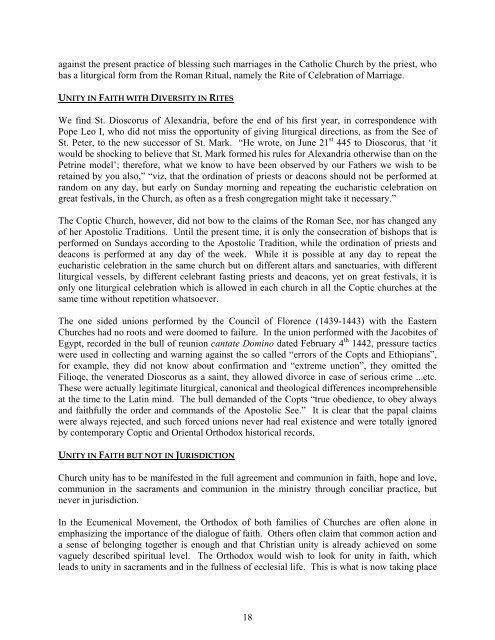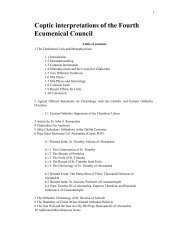Coptic Church & Ecumenical Movement - Saint Mina Coptic ...
Coptic Church & Ecumenical Movement - Saint Mina Coptic ...
Coptic Church & Ecumenical Movement - Saint Mina Coptic ...
You also want an ePaper? Increase the reach of your titles
YUMPU automatically turns print PDFs into web optimized ePapers that Google loves.
against the present practice of blessing such marriages in the Catholic <strong>Church</strong> by the priest, who<br />
has a liturgical form from the Roman Ritual, namely the Rite of Celebration of Marriage.<br />
UNITY IN FAITH WITH DIVERSITY IN RITES<br />
We find St. Dioscorus of Alexandria, before the end of his first year, in correspondence with<br />
Pope Leo I, who did not miss the opportunity of giving liturgical directions, as from the See of<br />
St. Peter, to the new successor of St. Mark. “He wrote, on June 21 st 445 to Dioscorus, that ‘it<br />
would be shocking to believe that St. Mark formed his rules for Alexandria otherwise than on the<br />
Petrine model’; therefore, what we know to have been observed by our Fathers we wish to be<br />
retained by you also,” “viz, that the ordination of priests or deacons should not be performed at<br />
random on any day, but early on Sunday morning and repeating the eucharistic celebration on<br />
great festivals, in the <strong>Church</strong>, as often as a fresh congregation might take it necessary.”<br />
The <strong>Coptic</strong> <strong>Church</strong>, however, did not bow to the claims of the Roman See, nor has changed any<br />
of her Apostolic Traditions. Until the present time, it is only the consecration of bishops that is<br />
performed on Sundays according to the Apostolic Tradition, while the ordination of priests and<br />
deacons is performed at any day of the week. While it is possible at any day to repeat the<br />
eucharistic celebration in the same church but on different altars and sanctuaries, with different<br />
liturgical vessels, by different celebrant fasting priests and deacons, yet on great festivals, it is<br />
only one liturgical celebration which is allowed in each church in all the <strong>Coptic</strong> churches at the<br />
same time without repetition whatsoever.<br />
The one sided unions performed by the Council of Florence (1439-1443) with the Eastern<br />
<strong>Church</strong>es had no roots and were doomed to failure. In the union performed with the Jacobites of<br />
Egypt, recorded in the bull of reunion cantate Domino dated February 4 th 1442, pressure tactics<br />
were used in collecting and warning against the so called “errors of the Copts and Ethiopians”,<br />
for example, they did not know about confirmation and “extreme unction”, they omitted the<br />
Filioqe, the venerated Dioscorus as a saint, they allowed divorce in case of serious crime ...etc.<br />
These were actually legitimate liturgical, canonical and theological differences incomprehensible<br />
at the time to the Latin mind. The bull demanded of the Copts “true obedience, to obey always<br />
and faithfully the order and commands of the Apostolic See.” It is clear that the papal claims<br />
were always rejected, and such forced unions never had real existence and were totally ignored<br />
by contemporary <strong>Coptic</strong> and Oriental Orthodox historical records.<br />
UNITY IN FAITH BUT NOT IN JURISDICTION<br />
<strong>Church</strong> unity has to be manifested in the full agreement and communion in faith, hope and love,<br />
communion in the sacraments and communion in the ministry through conciliar practice, but<br />
never in jurisdiction.<br />
In the <strong>Ecumenical</strong> <strong>Movement</strong>, the Orthodox of both families of <strong>Church</strong>es are often alone in<br />
emphasizing the importance of the dialogue of faith. Others often claim that common action and<br />
a sense of belonging together is enough and that Christian unity is already achieved on some<br />
vaguely described spiritual level. The Orthodox would wish to look for unity in faith, which<br />
leads to unity in sacraments and in the fullness of ecclesial life. This is what is now taking place<br />
18








